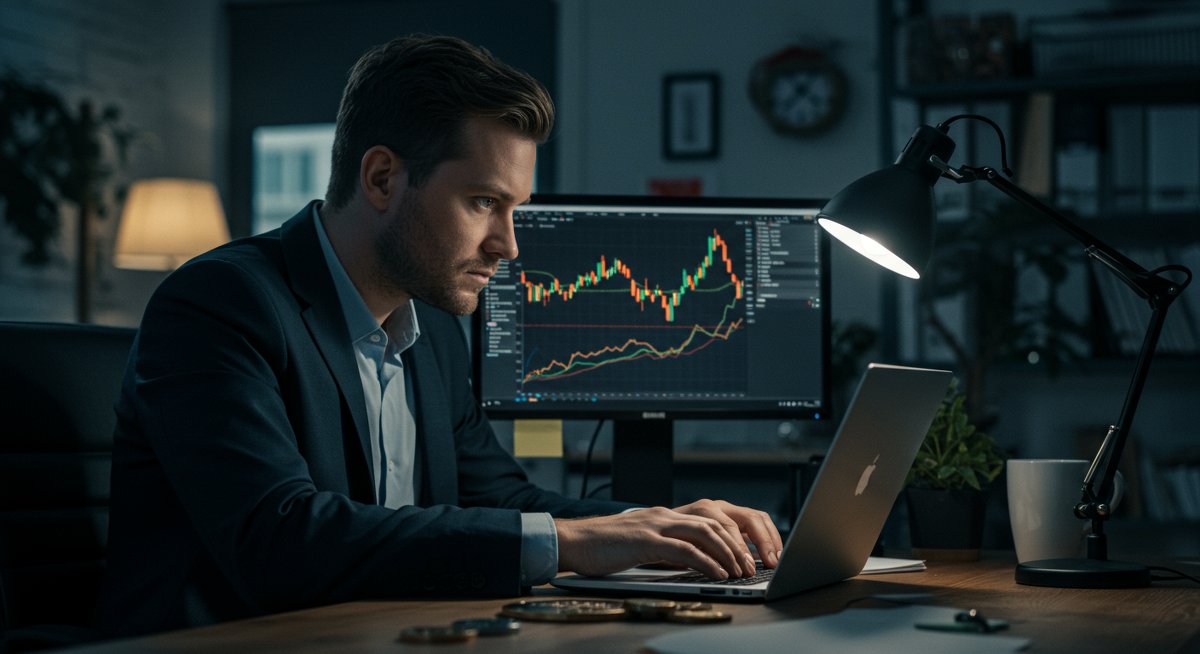The Reddit Rant That Started It All
So, I was scrolling through r/CryptoMarkets the other day, and this post title jumped out at me: "I genuinely believe Trump is pro-crypto so he can benefit from fraud, and get away with it legally." Okay, that's a pretty strong statement. The user went on to argue that Trump's sudden interest in crypto isn't about some grand vision for the future of finance, but rather a way for him and his associates to make a quick buck through pump-and-dump schemes, shielded by the speculative nature of the market. This got me thinking. Is there any truth to this? And more importantly, what does it mean for those of us trying to navigate the world of Bitcoin trading, especially from outside the US? The original poster (OP) clearly felt burned, referencing something called World Liberty Financial. It's easy to dismiss this as just another angry Redditor venting, but sometimes the hottest takes come from those who feel they've been personally affected. So, let's dig into this a bit deeper and see if there's any fire under all that smoke. Is Trump a crypto visionary, or just a savvy opportunist? And how can we, as international traders, protect ourselves either way?

Decoding the Trump Crypto Playbook
Let's be real, Trump's relationship with crypto has been… complicated. He used to bash Bitcoin, calling it “thin air” and preferring the good old US dollar. Now, suddenly, he's embracing it. What changed? Well, as the Reddit post suggests, maybe it’s not about a change of heart, but a change of strategy. The OP mentions pump-and-dump schemes, which are essentially when someone artificially inflates the price of an asset (like a cryptocurrency) through misleading positive statements, only to sell their own holdings at a profit before the price crashes, leaving other investors holding the bag. Now, I'm not saying Trump is definitely doing this, but the poster's point is that the current regulatory environment for crypto makes it ripe for this kind of manipulation, especially with someone who has a large following and influence. The argument is that by publicly supporting crypto, Trump creates hype, which then benefits his associates (or even himself indirectly) who may be involved in less-than-reputable crypto projects. When those projects inevitably fail, he can simply shrug and say, "Hey, it's a speculative investment, what did you expect?" It's a cynical view, sure, but it's worth considering, especially if you're new to Bitcoin trading. Understanding the potential motivations of influential figures can help you make more informed decisions.
What This Means for Your Bitcoin Wallet
Okay, so let's say, for the sake of argument, that the Reddit poster is right, and Trump's pro-crypto stance is at least partially self-serving. What does that actually mean for you and your Bitcoin holdings? First, it means you need to be extra cautious about any cryptocurrency that gets a sudden endorsement from a high-profile figure. That doesn't automatically make it a scam, but it should raise a red flag. Do your own research. Look into the project's fundamentals, the team behind it, and the technology it's built on. Don't just jump on the bandwagon because someone famous told you to. Second, it means you need to be prepared for increased volatility. If Trump's involvement does lead to a pump-and-dump scenario, the price of Bitcoin (and other cryptocurrencies) could experience wild swings. This can be scary, but it can also be an opportunity to buy low and sell high – if you know what you're doing. Which brings me to my third point: risk management. Now is the time to have clear profit-taking strategies. Set stop-loss orders to limit your losses, and don't invest more than you can afford to lose. Remember, the crypto market is already volatile enough; you don't need to add political manipulation to the mix.
The Murky Underbelly: Risks Nobody Highlights
Let’s address the elephant in the room. Crypto, while promising decentralization, isn’t immune to shady practices. Pump-and-dumps, insider trading, and outright scams are unfortunately part of the landscape. It's easy to get caught up in the hype and FOMO (fear of missing out), but that's exactly when you're most vulnerable. One of the biggest risks is investing in projects you don't understand. A fancy website and a charismatic founder don't equal a solid investment. Dig deeper. Read the whitepaper, check the code (if you can), and see what the community is saying. Another risk is over-leveraging. Trading with high leverage can amplify your gains, but it can also amplify your losses. If the market moves against you, you could lose your entire investment in a matter of minutes. Finally, there's the risk of simply holding your crypto on an exchange. Exchanges can get hacked, go bankrupt, or simply disappear with your funds. It's always a good idea to store your crypto in a secure wallet that you control. Not your keys, not your coins, remember? I'm not trying to scare you away from Bitcoin trading; I just want you to be aware of the risks involved. Knowledge is power, and the more you know, the better equipped you'll be to navigate the crypto market safely and successfully.
Crypto Regulations: A Global Minefield
If you're trading crypto from outside the US, things get even more complicated. Depending on where you live, the regulations surrounding Bitcoin and other cryptocurrencies can vary wildly. In some countries, crypto is completely legal and even encouraged. In others, it's heavily restricted or even banned. And in still others, the legal status is still unclear. This regulatory uncertainty can create a lot of confusion and risk for international traders. You need to be aware of the laws in your country and make sure you're complying with them. This includes paying taxes on any profits you make from trading crypto. Tax laws also vary from country to country, so it's important to get professional advice. Another thing to consider is currency exchange rates. When you're trading crypto in a different currency, you need to factor in the exchange rate, which can fluctuate and impact your profits. Finally, be aware of the potential for scams and fraud. Some countries have weaker consumer protection laws than others, which can make it easier for scammers to operate. Always do your research and be cautious about who you're dealing with. Trading crypto internationally can be exciting and profitable, but it's also important to be aware of the risks and to take steps to protect yourself.

From Zero to Trade: Practical Steps
Okay, so you're aware of the risks, you understand the potential impact of Trump's involvement, and you're ready to start trading Bitcoin. Where do you begin? First, you need to choose a reputable cryptocurrency exchange. There are many different exchanges out there, each with its own fees, features, and security measures. Do your research and choose one that's right for you. If you're a beginner, you might want to start with a user-friendly platform like Changelly. If you're a more experienced trader, you might prefer a platform like KuCoin that offers more advanced features. Once you've chosen an exchange, you'll need to create an account and verify your identity. This usually involves providing some personal information and uploading a copy of your ID. After your account is verified, you can deposit funds into it. Most exchanges accept deposits in fiat currency (like US dollars or Euros) as well as other cryptocurrencies. Once you have funds in your account, you can start trading Bitcoin. You can buy Bitcoin directly with fiat currency, or you can trade it for other cryptocurrencies. When you're trading, it's important to pay attention to the price charts and to use technical analysis tools to identify potential trading opportunities. And remember, always set stop-loss orders to limit your losses.
My Personal Take: Stay Informed, Stay Skeptical
So, what's my overall take on all of this? Well, I think the Reddit poster raises some valid points. Trump's pro-crypto stance is definitely something to watch closely, but I wouldn't go so far as to say it's definitely a scam. It's possible that he genuinely believes in the potential of Bitcoin and other cryptocurrencies. It's also possible that he sees it as a way to appeal to a younger, more tech-savvy demographic. Or, as the Reddit post suggests, it could be a combination of both. Regardless of his motivations, I think it's important to stay informed and to be skeptical. Don't just blindly follow the advice of anyone, even if they're a former president. Do your own research, understand the risks involved, and make your own decisions. The crypto market is full of opportunities, but it's also full of pitfalls. By staying informed, being skeptical, and managing your risk, you can increase your chances of success and avoid getting burned. Maybe I'm being too cautious, but in the world of Bitcoin trading, it's always better to be safe than sorry.